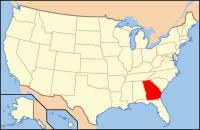Bulloch County, Georgia
| Bulloch County, Georgia | ||
|---|---|---|

Bulloch County Courthouse in Statesboro
|
||
|
||
 Location in the U.S. state of Georgia |
||
 Georgia's location in the U.S. |
||
| Founded | 1796 | |
| Named for | Archibald Bulloch | |
| Seat | Statesboro | |
| Largest city | Statesboro | |
| Area | ||
| • Total | 689 sq mi (1,785 km2) | |
| • Land | 673 sq mi (1,743 km2) | |
| • Water | 16 sq mi (41 km2), 2.3% | |
| Population (est.) | ||
| • (2015) | 72,651 | |
| • Density | 105/sq mi (41/km²) | |
| Congressional district | 12th | |
| Time zone | Eastern: UTC-5/-4 | |
| Website | www |
|
Bulloch County is a county located in the U.S. state of Georgia. As of the 2010 census, the population was 70,217. The county seat is Statesboro. The county was created on February 8, 1796 from colonial-era St. Phillip's parish.
It is named after Archibald Bulloch, a planter from South Carolina who served as Provincial Governor of Georgia. Archibald Bulloch was born in South Carolina but bought a plantation on the Savannah River. Politically active in opposing the British, he became the first provincial governor of Georgia, in January 1776.
In August 1904 the county was the scene of lynchings by whites of four African-American men allegedly suspects in a murder of a white farm family. Some blacks were attacked on the streets; so many left Statesboro and the county that farmers were short of labor.
Bulloch County comprises the Statesboro, GA Micropolitan Statistical Area, which is included in the Savannah–Hinesville–Statesboro Combined Statistical Area.
According to the U.S. Census Bureau, the county has a total area of 689 square miles (1,780 km2), of which 673 square miles (1,740 km2) is land and 16 square miles (41 km2) (2.3%) is water. The terrain is mostly flat, as the county is in the coastal plain region of Georgia. However, the landscape gets slightly hilly in the northwestern and central side of the county. Bulloch County is just southwest of the Ogeechee River and has many other small waterways, ponds, and swamps. Trees like bald cypress are seen in these areas. On higher ground, pine, oak, and many other tree varieties native to the southeastern United States thrive.
...
Wikipedia

